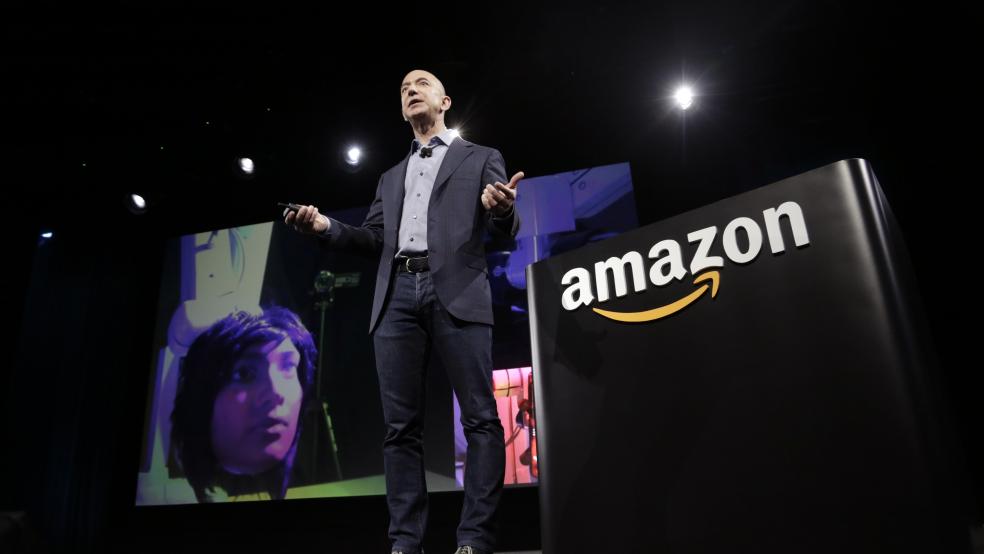When I think about Amazon.com’s business model these days, the image that springs immediately to mind – the one that I simply can’t shake – is that of Pac-Man eating his way through dot after dot on the screen.
That’s Amazon. Market after market, the company has ensured that its presence is pretty much ubiquitous. If I were in the mood to write one of those “stunt memoirs” akin to A.J. Jacobs’ The Year of Living Biblically, I suspect I could try and subsist an entire year directing my consumer dollars solely to Amazon.
With this week’s dramatic launch of the Amazon Fire smartphone, I could probably even pull it off.
Related: How Your Smartphone Can and Will Be Used Against You in a Court of Law
Consider, for a moment, just how dependent you could have become on Amazon by now, especially if you happen to live near the company’s Seattle headquarters or in major metropolitan areas of California, where it is offering same-day delivery of grocery orders placed online via Amazon Fresh. (New York deliveries will come sometime this year, the buzz says.)
Even though most of us can’t order our salad fixings and steaks from Amazon just yet, we can still take advantage of Amazon Prime Pantry, yet another new service being rolled out this year. This one gives Amazon Prime members (who pay $99 a year to belong to the elite club) the ability to buy and have delivered for a flat fee up to 45 pounds net weight of groceries from Amazon. Your days of lugging incredibly heavy jugs of laundry detergent and kitty litter could be at an end, if only you climb aboard the bandwagon.… What’s not to love?
Like music? Well, if you’re a Prime member, Amazon also announced this month that you can stream all kinds of music – more than a million songs – from its archives for free, in the same way you already can stream video. (Of course, you’ll want to spend $25 or so for space to store it all in the Amazon cloud.) Amazon also just struck a deal with HBO enabling Prime members to (finally!) watch “The Wire” or catch up on some seasons of current shows like “True Blood.”
The list goes on. New furniture or appliances? Check. Dog food? Check. If you’ve decided to propose to your girlfriend, you can even pick up a diamond ring on Amazon. And if you get tired of your old lawn furniture, you can sell it – via Amazon. Pac-Man, nibbling away.
It sounds tremendously convenient, doesn’t it, to be able to turn to a single provider, and for that vendor to have above-average customer service?
Here’s the question to ask yourself, however. Just how much insight into your life do you want to give any single corporation?
Related: Nine Companies That Are Selling Your Secrets
Amazon’s new phone has all kinds of cool features, including “Firefly,” an app that will permit you to use it to scan items you encounter in brick-and-mortar stores – and buy instantly, via the phone, from Amazon. It’s like being sucked into the Amazon vortex, and never being allowed to escape. Sure, the phone won’t force you to hit the “buy” button. It’s just going to make it so convenient to do that you’ll start finding it harder and harder to resist.
Up until now, Amazon’s growing clout has been tough to complain about legitimately. Sure, other retailers have griped a lot, but the harsh truth is that Amazon figured out the whole cyber-retailing thing faster and better than they did – and executed. That’s capitalism for you. Publishers didn’t like Amazon’s pricing model, but readers did. And publishers need readers.
Amazon’s market share is now so large, though, that in some cases, convenience may end up trumping value in some of its offers to consumers. That seems to be the case with Amazon Fresh, for instance, according to at least some trial runs.
The spat with Hachette doesn’t worry me because of what it implies about the publishing industry – which has its own business problems to resolve before trying to reshape Amazon. Rather, Amazon’s apparent indifference to its customer base – telling them to go elsewhere in quest of much-desired books by authors like Stephen Colbert and JK Rowling, or movies like “The Lego Movie” – is jarring.
Perhaps Amazon has swallowed up too much of the market; so much, that it can tell its customers it chooses not to provide them with a specific item without fear of losing the rest of their business. How many irked bookbuyers are yanking their entire Amazon account simply because they can’t spend a few bucks on the new Colbert book on the site? Are they going to give up their Kindles, their Amazon Prime Pantry, that streaming HBO, the video content delivered via their new Amazon Fire TV? I suspect not.
But where does this all end? How long does Amazon continue rolling out new products at near-zero profit margins? CEO Jeff Bezos has made it clear he cares about beating rivals, not profiting from customers – but what happens when those rivals have all been squashed underfoot? With new products and services being rolled out at an ever-faster rate, and traditional competitors becoming irrelevant more rapidly, how soon until known worlds have been conquered? By that point, we may all have succumbed to the Amazon allure – the sheer convenience of the one-click ordering process – and be a captive market.
There’s a lot to be said for making conscious consumer choices based not solely on price and convenience, or even bells and whistles. Amazon’s adventures in constant expansion and innovation, however fascinating to watch, are a reminder of that.
Top Reads from The Fiscal Times:






